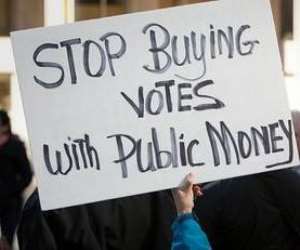
Vote buying has been a recurring feature of Ghanaian elections, particularly in rural and marginalized communities where poverty and socioeconomic vulnerabilities are prevalent. Candidates, political parties, and their agents often exploit these vulnerabilities by offering cash, food, clothing, or other material goods to sway voters' decisions. While direct vote buying is more prevalent in parliamentary elections, where constituency-level contests are fiercely contested, it also occurs in presidential races, albeit to a lesser extent. Vote buying remains a prevalent issue in Ghanaian politics, affecting both presidential and parliamentary elections. This article aims to explore the effects of vote buying on the democratic process and societal dynamics in Ghana.
Vote Buying in Ghanaian Elections
In recent years, vote buying has become increasingly common in Ghanaian elections. Political candidates and parties engage in various tactics, including distributing cash, food, and other goods, to sway voters' decisions. Despite being illegal, the enforcement of laws against vote buying has been insufficient, allowing the practice to persist.
Effects on Electoral Integrity
The prevalence of vote buying undermines the integrity of Ghanaian elections. When voters are influenced by material incentives rather than informed decision-making based on policies and principles, the legitimacy of electoral outcomes is called into question. This erosion of electoral integrity undermines public trust in the electoral system and elected officials.
Impact on Political Participation
Vote buying can have detrimental effects on political participation and civic engagement. By commodifying the electoral process, it discourages meaningful political discourse and civic involvement. Instead of engaging in informed debates about policy issues, voters may become passive recipients of material incentives, further marginalizing their voices in the political sphere.
Perpetuation of Clientelism and Corruption
The prevalence of vote buying perpetuates clientelism and corruption within Ghanaian politics. Candidates and parties rely on patronage networks to secure votes, creating a system of dependency and favouritism. This clientelist approach reinforces existing power dynamics and fosters corruption, as politicians prioritize the interests of select groups over the broader public good.
Undermining Democratic Governance
Vote buying undermines the foundations of democratic governance in Ghana. By distorting electoral outcomes and perpetuating corruption, it undermines accountability, transparency, and representation. Efforts to build strong democratic institutions and promote inclusive governance are hampered by the prevalence of vote buying.
Addressing vote buying requires a comprehensive approach involving legal reforms, enforcement measures, and civic education initiatives. Strengthening anti-corruption laws and electoral regulations is essential to deter vote buying and hold perpetrators accountable. Additionally, promoting transparency in campaign financing and voter education can empower citizens to make informed choices based on principles rather than material incentives.
The impact of vote buying on Ghanaian elections is significant, undermining electoral integrity, political participation, and democratic governance. To safeguard the democratic process and promote inclusive governance, concerted efforts are needed to combat vote buying through legal reforms, enforcement measures, and civic education initiatives. Only by addressing this pervasive challenge can Ghana realize its full democratic potential and advance the interests of all its citizens.
By Godwin Kwame Mileba DPF,BEd,MEd




 Court dismisses Serwaa Amihere case against Henry Fitz, two others
Court dismisses Serwaa Amihere case against Henry Fitz, two others
 Stolen BRVs: Bi-partisan parliamentary probe non-negotiable — Dr. Omane Boamah
Stolen BRVs: Bi-partisan parliamentary probe non-negotiable — Dr. Omane Boamah
 Bawumia begins regional campaign tour on Monday
Bawumia begins regional campaign tour on Monday
 With great urgency backed by verifiable data, facts and figures dismiss COCOBOD,...
With great urgency backed by verifiable data, facts and figures dismiss COCOBOD,...
 EC’s statement on obsolete BVDs discovery “lies, half-truths, pure fantasies” – ...
EC’s statement on obsolete BVDs discovery “lies, half-truths, pure fantasies” – ...
 Nalerigu court impound vehicles of DCE, Director of Chereponi district for owing...
Nalerigu court impound vehicles of DCE, Director of Chereponi district for owing...
 Cop, 7 others grabbed over $523,000 Gold Scam
Cop, 7 others grabbed over $523,000 Gold Scam
 Akufo-Addo’s driver wins Dadekotopon NPP Parliamentary Primary
Akufo-Addo’s driver wins Dadekotopon NPP Parliamentary Primary
 Investigate, jail persons liable for GRA-SML contract – Manasseh
Investigate, jail persons liable for GRA-SML contract – Manasseh
 Lawyer wins Akan NPP Parliamentary Candidate primary
Lawyer wins Akan NPP Parliamentary Candidate primary
